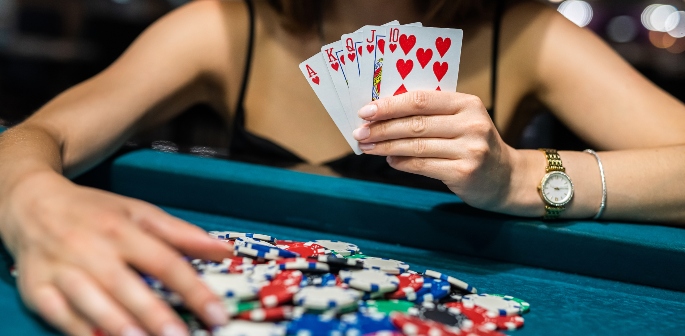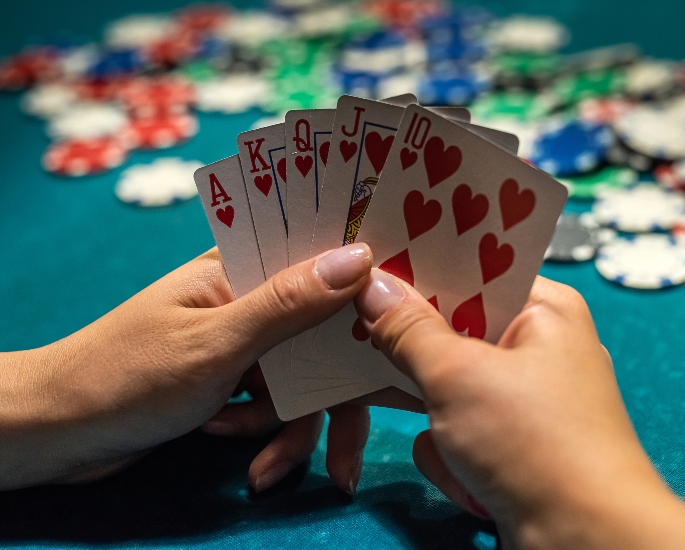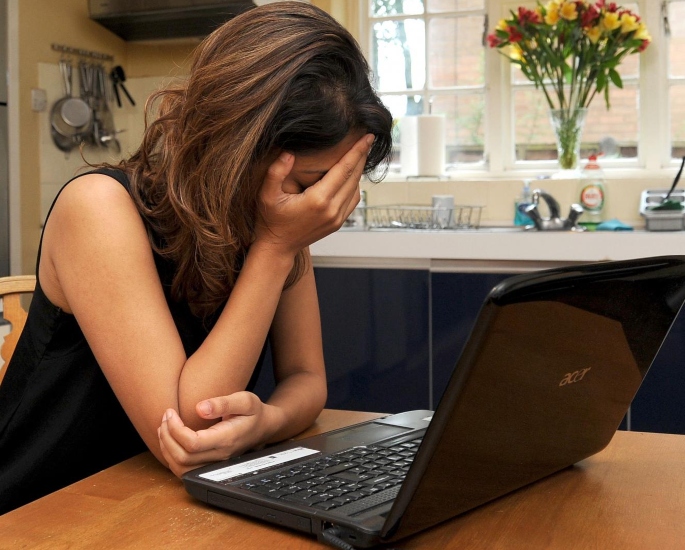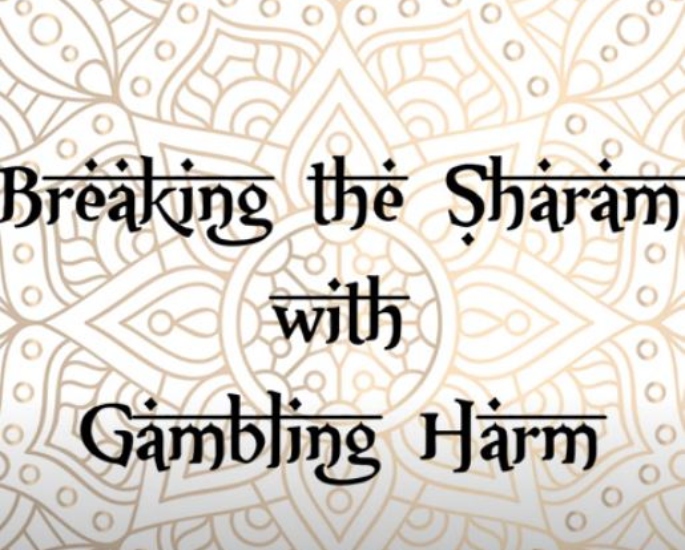"I started pawning my mum's jewellery"
Although gambling addicts are disproportionately male, British Asian female gamblers have seen a stark increase.
Placing bets, checking odds or buying scratchcards is extremely accessible in the modern world. People can access this and much more online.
Through popular sites like Ladbrokes, Sky Bet and Coral, gamblers can deposit money, withdraw winnings and place bets with just a few taps.
Although gambling addiction is well-known amongst the male population, is it really affecting women that badly?
According to a 2022 BeGambleAware study, 1 million women are at risk of suffering from gambling harm.
In 2022, The Guardian also reported how women seeking treatment has seen a meteoric rise.
The number has doubled from 1134 women between 2015-16 to 2423 women in 2020-21.
However, BeGambleAware alarmingly revealed how two in five women are unwilling to seek treatment due to embarrassment and stigma.
Especially within British Asian communities, women are extremely silent about their gambling issues.
This type of secrecy can lead to stress and anxiety whilst playing a pivotal role in affecting women’s mental health.
DESIblitz explores the impact of gambling and speaks to some British Asian women to get their first-hand experiences of this growing issue.
Why is Gambling Taboo?
The process of gambling within South Asian communities in the UK is widely seen as normal.
Card games are a great example of this where elders are seen at parties or functions betting pennies in popular games for fun.
This type of participation is joyful, sociable and adds a bit of competitive nature with the players.
However, it is when individuals develop daily habits and addictions that propels gambling as taboo.
The frightening aspect of this is how quickly this issue can grip someone. One big win online, a payout on a scratch card or a simple free-to-play game can entice people into betting more.
It is this loss of control that starts causing anxiety within people.
British Asian communities are adamant on their stance of how shameful gambling addicts should feel.
However, they don’t get to the root cause of the problem. Therefore, addicts don’t seek help and their conditions worsen.
This is how male addicts feel so it is even more terrifying for women to express their needs. A story shared by Mina* on BeGambleAware highlighted this:
“I think it definitely is a bit of a taboo in the Asian community, especially when it comes to girls.
“I couldn’t go to my mum and dad. They’d hit the roof. It’s not seen as a good thing.
“So, I think they’d probably judge me.”
DESIblitz spoke to Afshana Khan*, a 36-year-old teacher and recovering gambling addict from Birmingham.
She discussed the initial stages of her betting journey and why she felt things could have been stopped before they got worse.
“I went to the shop when I was 18 with my girls and they were all getting drinks for one of the nights out we had at uni.
“But I don’t drink, so I was waiting at the counter and saw those scratchcards you can get for £1.
“I bought about 10 ’cause I thought, it’s not denting my pocket and if I win then happy days. Ended up winning about £30 and didn’t think much of it.
“But next thing you know, I was buying scratchcards every night we went out. My mates would spend money on drinks and I would spend it on these cards.
“When I didn’t win, I’d buy more. My girls would tell me to stop ’cause it was getting weird but I eventually started buying them on my own.
“I realised I was doing something bad. But who could I tell? I couldn’t even turn around to my best friend and say, ‘I have an addiction’.
“To be honest, it didn’t even seem like that. I never thought ‘I’m a gambler’. I just thought I was spending my money on stupid things.
“But I was in denial. There’s this unheard rule in Asian houses where if you’re caught gambling, then you’re a criminal kind of thing.
“My parents were strict as it is. If I even told them about this, I would’ve been ridiculed.”
“The whole family and community would have known.”
The shame and embarrassment instilled in South Asian communities in the UK are at the core of why gambling is so taboo.
Open discussion and awareness around gambling is the priority. Once that is established then situations such as Mina and Afhsana’s can be avoided.
The Rise of Female Gamblers
It comes as no surprise that the culture of betting is seen every day. From playing bingo or staking an innocent wager against a friend.
However, why has gambling seen a rise in female participants?
In August 2021, Oliver Rowe, the Global Sector Head of the market research company, YouGov, revealed:
“YouGov data confirms some widely held gender stereotypes.
“Women are keener than men to buy lottery tickets (72% vs. 58% of men) or play bingo or keno online (6% vs. 2% of men).”
He also explains that 28% of British women who gamble online only do so so they can fantasise about winning.
Comparing that to 21% of men who said they fantasise about winning shows the poignant factor in why gambling appeals to women in the UK.
In February 2022, Liz Karter, an expert in gambling addiction in women highlighted why certain behaviours manifest differently in females than males:
“We know the easy availability of online gambling leads many women to games which appear innocent and socially acceptable.
“The games seem safe and familiar, as they are so similar to the free play digital games we are all now used to playing.”
The ease of online gambling and the range of games available means women find it easier than ever to place bets.
We spoke to Neelam Choudhury*, a 23-year-old student from Coventry, who told us how her interest in gambling started:
“I always knew about the casino and in films, they look so glamorous and it made me want to go to one.
“But, being Indian, I didn’t even want to risk it. Imagine an Indian girl getting caught in one of them, I’d be thrown out of the house.
“Then I found out you can basically play the same games online. My guy mates told me about it and would always play poker and win money.
“I thought ‘why not?’.
“Once I started, I was hooked. I’d put a fiver down, lose, then another fiver and win. It was fun and I didn’t think I was doing any harm.
“But then I saw all the other games you could play. Slots, bingo, blackjack etc – they even have virtual people dealing the cards to you so it’s like the casino experience at home.
“I like how easy it is. When you come back from work or have a long day, it’s nice to unwind. Similar to how people have a drink or do exercise, it’s kind of the same.”
Neelam’s experience illustrates the accessibility of gambling games and the enhanced experience that is readily available.
Anaiya Butt*, a law student from Birmingham, explained how women gambling is becoming normal. Yet, the cultural perceptions remain the same:
“Me and my flatmates play poker at pre-drinks and it’s so fun. We’ll even go casino before going to a bar or even after ’cause they’re open so late.
“We see so many girls there that I think it’s just normal now, there’s nothing wrong with it.
“But you can always tell us who’s paranoid being there, typically all the brown girls.”
“I get it though. If my dad caught me in a casino, it would be like ‘oh what would people say’. But, we just have a bit of fun and leave.
“But men can do it freely? Sometimes people think Asian women should just be at home but why? Why are we judged so much?”
This shows how British Asian women and women, in general, are increasing within the gambling scene.
Although these stories and first-hand experiences explain why women get involved, the stigma attached to it means an open dialogue can’t be achieved.
The Effects of Gambling on British Asian Women
With British Asian women, the lingering view is that the more they hide their gambling habits, the less backlash they will receive.
Yet, this can lead to adverse effects. Mental health, self-harm and constant anxiety from the thought of ‘shaming’ the family.
As part of Oliver Rowe’s YouGov findings, he details:
“Notable differences between women and men also appear when looking at general gambling beliefs.
“British women, for instance, are more likely than men to feel online gambling should not be allowed (45% vs. 39% of men).
“Other attitudinal data shows men are more likely than women to talk about gambling with friends and family (20% vs. 12% of women).”
Aisha Rathod*, a former gambling addict details how she got treated once her family became aware of her problem:
“I knew I had a problem for a while but couldn’t stop. Every time I’d go a couple of days without betting but then make up for it thinking I had things under control.
“I found out about all these offers that betting games do when you sign up. Like free cash and matched bets so I thought I’m not really losing anything.
“Things got bad and it got to a stage where I kept asking my parents for money saying I needed it for uni books.
“I think my mum got worried and opened one of my bank statement letters and saw all of my deposits on gambling websites.
“She called me and was ranting down the phone at me, saying how I’ve disgraced her and I should be ashamed of myself.
“My dad got on and said ‘only criminals do this type of stuff’. They kept going on about the family and if my cousins knew then they would sort me out.
“I kept thinking they haven’t even asked why I was doing this or trying to talk to me. It was more about embarrassing the family. I felt so ashamed and lonely.”
Afshana Khan also had a similar experience. She expresses how she started to gamble away her prized possessions:
“It started with those scratchcards and then moved on to bigger things. Once you win, you don’t want it to stop so find other ways of upping the stakes.
“I started pawning my mum’s jewellery, rings, my sister’s bangles, anything. But who could I turn to?
“All I kept saying to myself was ‘it’s fine’ or ‘just one win and that’s it’. Eventually, my family realised. It was actually my sister first but she told my mum thinking they would help.
“I never felt so depressed in my life, they said who would want to marry a gambler, how would I succeed in life and things like that.
“They saw me as a burden, someone beyond repair.
“They didn’t see gambling as an addiction, they saw it as a choice I had made.”
“My parents felt betrayed and saw me as a criminal. They felt like I was stealing from them to have fun but didn’t see the bigger picture.
“I was so mentally drained and felt like I couldn’t cope. The worst thing is that word got out about it and everyone turned their back on me.
“Aunties and uncles I saw on the street looking at me up and down. At family functions, no one would approach me or they would just look at me until I couldn’t take it anymore.”
This shows just how stigmatic gambling is within British Asian communities, especially with women.
This results in anguish, shame, mental health issues and a strong sense of loneliness.
But, with the rise of British Asian women in gambling, there are resources available that promote a wider discussion.
Breaking the Sharam Project
With such a rise of British Asian women in gambling, many feel there is no progress in evolving the stigmatic conversation.
Although there are helpful resources available such as BeGambleAware and GamCare, British Asian women are still reluctant to reach out to these organisations for help.
This is not to say these tools aren’t helpful, but they do not necessarily understand the role Desi culture plays in gambling addiction.
However, ARA Recovery for All and Beacon Counselling Trust have come up with the Breaking the Sharam project.
The reduction program addresses gambling harm specifically in South Asian communities in the UK.
Breaking the Sharam employs local faith leaders and community champions using a culturally relevant model.
By doing this, they hope to build a foundation for those from South Asian backgrounds to feel safer in discussing their issues.
Their free and non-judgmental approach is an excellent initiative in getting more British Asian women to receive aid in eradicating their gambling addiction.
Additionally, it has inspiring ambitions to build more tolerant South Asian communities in the UK.
Hopefully, fewer women feel inclined to stay silent on this issue in the future.

































































